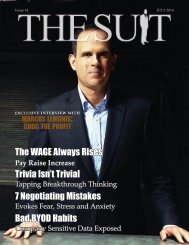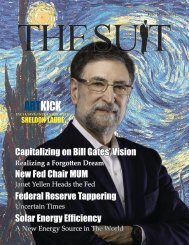One City Built to Last
The news is in: On November 7, 2014, the justices announced they would decide on a lawsuit claiming that the language of the Affordable Care Act doesn’t allow the government to provide tax-credits to low-and-moderate-income health insurance consumers using federally funded Obamacare exchanges operating in more than 30 states. Indeed, there’s a medical quagmire. And there is a lack of communication between doctors, staffing and patients. For example, the Affordable Care Act isn’t just about insurance coverage. The legislation is also about transforming the way health care is provided. In fact, it has brought in new competitors, services and business practices, which are in turn producing substantial industry shifts that affect all players along health care’s value chain. Read Amy Armstrongs story on page 16. On page 21, our reporter Judy Magness, profiles companies all over the country making incredible advances. Take a look at Functional Medicine and the driving breakthroughs in breast cancer while
The news is in: On November 7, 2014, the justices announced they would decide on a lawsuit claiming that the language of the Affordable Care Act doesn’t allow the government to provide tax-credits to low-and-moderate-income health insurance consumers using federally funded Obamacare exchanges operating in more than 30 states. Indeed, there’s a medical quagmire. And there is a lack of communication between doctors, staffing and patients. For example, the Affordable Care Act isn’t just about insurance coverage. The legislation is also about transforming the way health care is provided. In fact, it has brought in new competitors, services and business practices, which are in turn producing substantial industry shifts that affect all players along health care’s value chain. Read Amy Armstrongs story on page 16. On page 21, our reporter Judy Magness, profiles companies all over the country making incredible advances. Take a look at Functional Medicine and the driving breakthroughs in breast cancer while
Create successful ePaper yourself
Turn your PDF publications into a flip-book with our unique Google optimized e-Paper software.
y enid burns<br />
HELPING SMALL<br />
LENDERS IN TIMES<br />
OF INCREASING<br />
REGULATION<br />
The economic downturn experienced at the close of the<br />
last decade was a transformative time for the financial<br />
industry's lending segment. Increased regulations –<br />
meant <strong>to</strong> help consumers – actually made small loans<br />
more expensive and more difficult <strong>to</strong> obtain. <strong>One</strong> company,<br />
Infusit, hopes <strong>to</strong> remedy that by supplying cus<strong>to</strong>mer<br />
support services <strong>to</strong> small and medium-size lenders,<br />
so they can continue <strong>to</strong> provide small loans and<br />
lines of credit.<br />
Since the debacle of 2008 and<br />
2009, as regulation from the<br />
state and federal levels increased,<br />
many larger banks simply<br />
s<strong>to</strong>pped providing smaller loans<br />
and lines of credit <strong>to</strong> cus<strong>to</strong>mers. While<br />
seemingly opening the door for smaller<br />
lenders <strong>to</strong> provide these services,<br />
new regulations imposed by state and<br />
federal government made lending <strong>to</strong><br />
consumers increasingly difficult, hurting<br />
both lenders and consumers.<br />
“Most of the evolution happening<br />
in the industry since the recession has<br />
really, I think, affected the average<br />
consumer more negatively than positively,”<br />
said Randall Wasserman, president<br />
of the financial cus<strong>to</strong>mer service<br />
firm Infusit. “You would think that<br />
increased regulation would be a good<br />
thing, and it can be in the long run, but<br />
what happens in the short term is that<br />
the pendulum swings <strong>to</strong>o far the other<br />
way. And, what we saw happen, is<br />
that instead of increasing credit, banks<br />
decreased the availability of credit – or<br />
cut it off al<strong>to</strong>gether.”<br />
Over-Regulation Leads <strong>to</strong> Under-Funding<br />
Regulation has all but brought the<br />
small loan business <strong>to</strong> a standstill, especially<br />
in states with <strong>to</strong>ugher regulations,<br />
such as California, New York,<br />
Connecticut and Florida, where state<br />
regula<strong>to</strong>ry laws discourage companies<br />
from lending money. In New York,<br />
Connecticut and Florida, the state<br />
dropped the interest rates lenders can<br />
charge, making offering small loans<br />
less profitable. In California, Wasserman<br />
offers an example of how new<br />
regulations for lenders determine the<br />
maximum fees on loans. For instance,<br />
a loan of under $2,500 cannot accrue<br />
fees over a certain amount, such as 12<br />
percent of the loan. As a result, lenders<br />
simply s<strong>to</strong>pped loaning in that category,<br />
leaving credit-strapped consumers<br />
high and dry. Consequently, many<br />
cus<strong>to</strong>mers were forced <strong>to</strong> look in other<br />
states <strong>to</strong> get financial help, actually<br />
paying higher fees in the process.<br />
“So, in trying <strong>to</strong> help the consumer,<br />
some states over-regulated and forced<br />
consumers <strong>to</strong> look elsewhere,” Wasserman<br />
<strong>to</strong>ld The Suit Magazine, in<br />
an interview. “That drives cus<strong>to</strong>mers<br />
<strong>to</strong> neighboring states, … where they<br />
end up paying much, much more for<br />
small loans and lines of credit than<br />
they would have if it wasn't such an<br />
over-regulated environment.”<br />
Supporting Small Loans<br />
Wasserman's firm, Infusit, provides<br />
cus<strong>to</strong>mer service, call center support,<br />
software, and other services for small<br />
<strong>to</strong> medium-sized lenders. This, in turn,<br />
helps reduce operational costs for<br />
those lenders, allowing them access <strong>to</strong><br />
more capital that they can use for loans<br />
<strong>to</strong> consumers.<br />
“I would like <strong>to</strong> see more credit and<br />
lower costs of capital made available<br />
<strong>to</strong> small lenders <strong>to</strong> drive down some<br />
of the borrowing rates, which will help<br />
them <strong>to</strong> grow,” Wasserman said. “This<br />
will enable them, in turn, <strong>to</strong> provide<br />
THE SUIT MAGAZINE - NOV 2014










